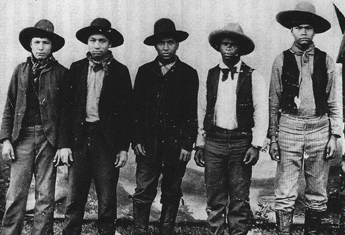It was a story I almost didn't dare to tell.
My first exposure to the multi-racial gang of black and Creek Indian marauders who rampaged through Indian Territory in the summer of 1895 was a photo taken soon after their capture. They stand expressionless and staring directly at the camera. All five of them look so terribly young. Their empty black and brown faces almost demand that you impose a story on them, that you fill them up; they look so drained, yet so evocative of a strange and iconographic time and place.

The Rufus Buck Gang in 1895. Rufus Buck is third from the left.
(Image by Public Domain) Details DMCA
I wanted to build a story around them. The group's name--the Rufus Buck Gang--was stunning. The very name of the leader of this brutal black/Indian gang invoked the infamous "Black Buck" stereotype. But he was almost a boy--no black stud here. Just as quickly as the stereotype was invoked, it was squashed. Then I learned that his aim was to reclaim Indian lands, to drive the increasing numbers of whites from lands that had been promised to the Indian nations. He was taking on the U.S. government with no more than a gang of five gangly youths. Foolish, naà �ve, mad. It had to be the work of a messianic temperament--a downright religious zeal. This was complexity far beyond the "Buck" stereotype. He might have been an innocent zealot on a mad quest, righteous yet brutal, understandable yet unforgivable, sympathetic yet horrific.
Research opened up the fascinating landscape of the turn-of-the-century Indian Territories, a strange, multi-racial netherworld overseen by "Hanging Judge" Isaac Parker, containing more whites than Indians at that point, and housing a healthy number of black freedmen who held positions of responsibility, such as lawmen hunting down the surfeit of criminals, black, red and white, who thrived there. The story promised lawlessness, politics, the intersection of African-American and Native American peoples" It was a fascinating time in our history.
I wanted to explore this group and their extraordinary turn of the century milieu, but I didn't dare. How could I so baldly invoke stereotypical Black Buck in the form of a young half-black, half-Indian man who was hanged for the rape of a white woman (though his crimes crossed color lines and included murder)? Did I dare to evoke black enslavement to Native Americans and their subsequent relationship? Did I dare tell a story in which a black male turns his fury outward at his oppressors as opposed to turning it inward on himself? Did I dare tell a story that, true to most of black history, ends in something other than reconciliation and triumph for its central characters?For more than 10 years, I did not dare. I paid what amounts to a "black tax" on many of our national stories. We pay by not telling them. We avoid them because, for blacks, they invoke painful memories (if they happen not to center in the 60s), and whites shrink from the memory of crimes, implicit and explicit, committed in their names.
It appears that shame--black and white--can shrink us. In literature we've been historically reduced to a slither of a people. Writers like me self-censor for fear of offending, for fear of not finding an audience. We don't tell our stories in the context of this nation. We focus on all-black worlds, or limit ourselves to topics that do not honestly prick our racial consciences. Is it any wonder that the most talked-about book invoking our history is The Help, written by and revolving around a white woman? From that majority point-of-view, the sharp edges would be sanded down. Our history would be prettily blurred to adhere to comforting preconceptions."Those who cannot remember the past are condemned to repeat it," George Santayana famously said. That thought is chilling on the context of the stories we black Americans fail to tell each other.





